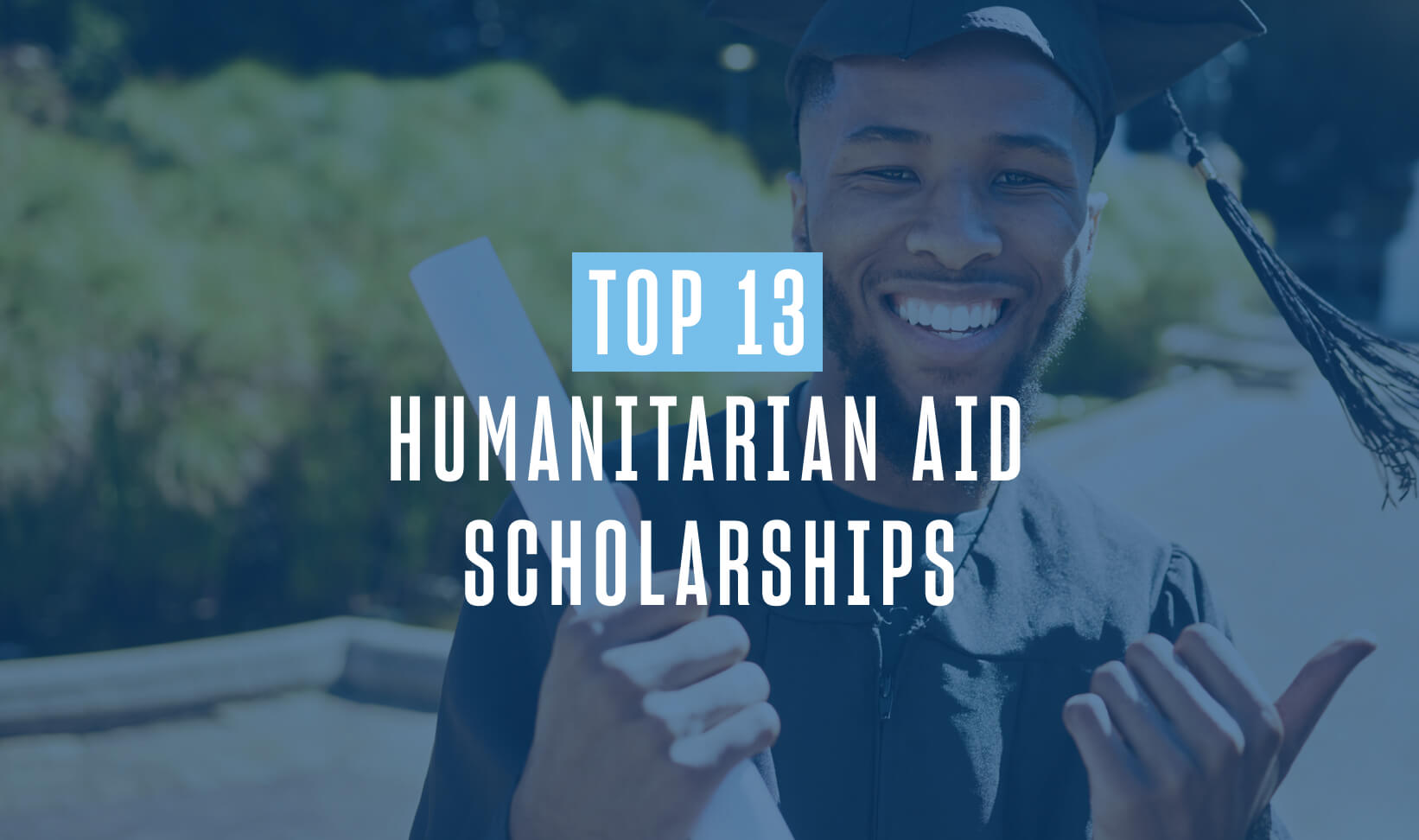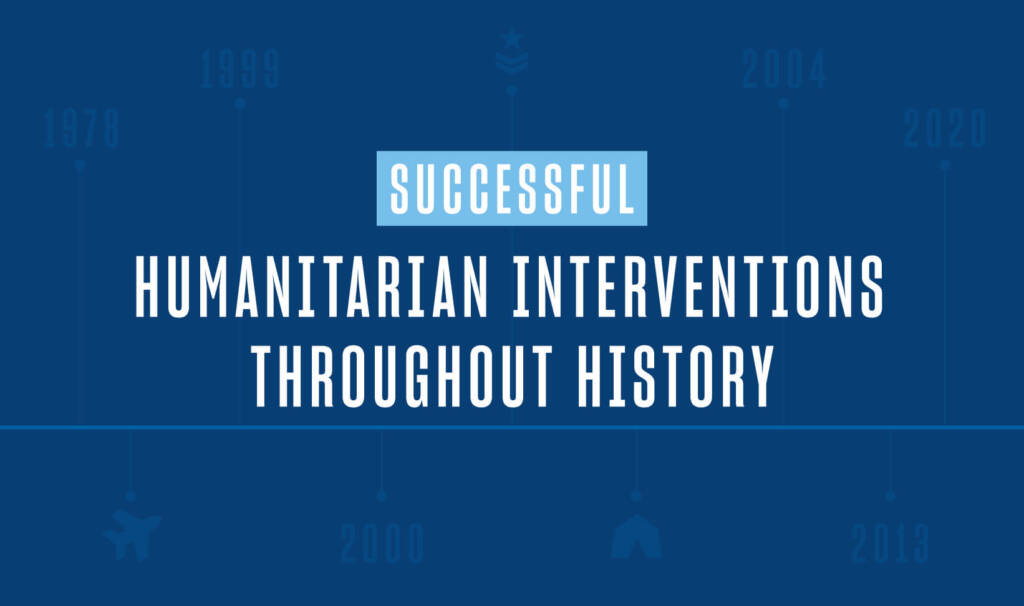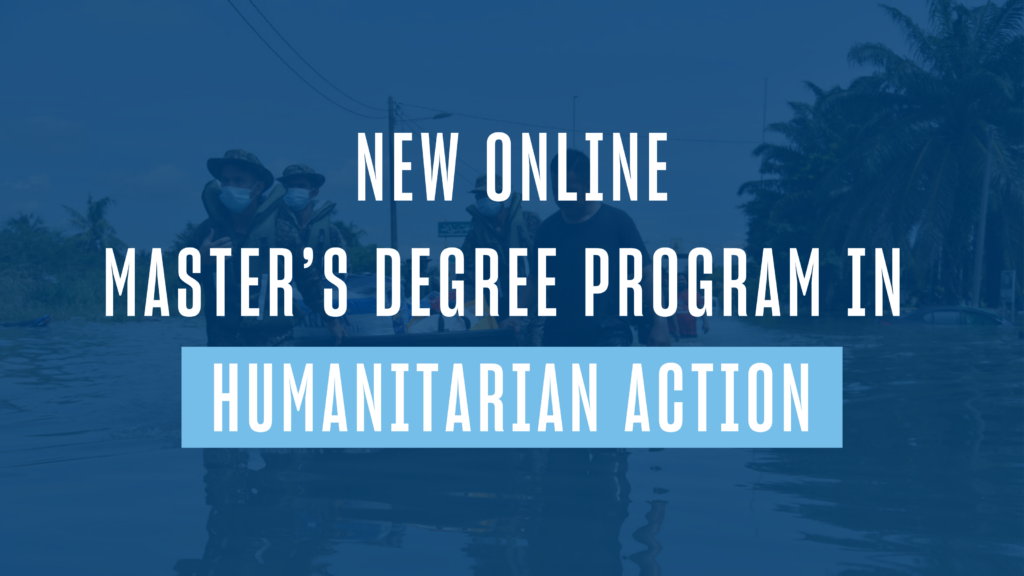An advanced degree in humanitarian work is a valuable tool that can provide beneficial knowledge, professional skills and meaningful connections, but in many cases, the question of whether to apply comes down to cost. The good news is that there are many scholarship opportunities available that can help defray the cost of higher education — you just need to know where to look.
Keep reading to discover how to find humanitarian scholarships, our list of some of the top opportunities and tips to help ensure a successful application.
How to Find Humanitarian Scholarships
There are a lot of available scholarships, but knowing where to look can be a challenge. Consider the following resources:
Scholarship-specific websites
Search for specific opportunities based on your interests, career goals and upcoming deadlines. Many of these sites also provide additional scholarship resources and information on other forms of financial aid.
Financial aid office
If you are currently an undergraduate student or you’re looking at a specific college or university, contact that institution’s financial aid office. Specific departments may also have information on program-specific scholarships.
Guidance department
High school students would benefit from visiting the guidance department as counselors can help navigate the scholarship process and may be able to provide insight on specific opportunities.
Professional associations, organizations and foundations
These entities may offer funding opportunities for those pursuing careers in humanitarian work. Examples of relevant associations, organizations and foundations include:
- International Association of Professionals in Humanitarian Assistance and Protection
- Sphere
- Active Learning Network for Accountability and Performance in Humanitarian Action
- International Humanitarian Studies Association
- International Committee of the Red Cross
- Humanitarian Aid Foundation
- Ford Foundation
Humanitarian Scholarship Chart
Looking for a quick snapshot of the scholarships on our list? Here are the details:

Humanitarian Scholarship List
Now let’s explore each scholarship in more detail. Please note that these are listed in alphabetical order and are not ranked in any way.
Amount: Varies
Details: The American Academy of Family Physicians (AAFP) offers a variety of global health scholarships, in addition to international travel scholarships and funding for fellowships and training programs.
Eligibility requirements: In most cases, applicants must be medical students, graduate students or college graduates. Each scholarship or funding opportunity has specific criteria.
Application materials: Will vary by scholarship.
Additional information: These scholarship opportunities are intended to help offset the cost of a global health services trip.
Amount: $20,000–$50,000
Details: These fellowships provide support to women who are non-U.S. citizens and intend to return to their home country to pursue a professional career.
Eligibility requirements. Must have earned a bachelor’s degree (or a master’s degree, depending on the fellowship) by the application deadline; cannot be a U.S. citizen; open to women (including those who identify as women) and be proficient in English. All eligibility requirements can be found online.
Application materials: The online application includes background information, a proposal, two letters of recommendation, proof of highest degree earned, transcripts, proof of current enrollment and proof of English proficiency. All required application components can be found online.
Additional information: Recipients of the award have become leaders in academia, community activity, business, government, the arts and science.
Amount: Varies
Details: The Fulbright Scholars Program awards more than 1,700 fellowships per year, which allows more than 800 students from the U.S. to go abroad and more than 900 visiting scholars to come to the United States. The Fulbright U.S. Scholars Program in particular offers more than 400 awards in more than 135 countries. These competitive fellowships fall into four general categories: teaching, research, a teaching/research combination or professional project. Other types of awards include Fulbright Postdoctoral Awards, Fulbright Distinguished Scholar Awards and Fulbright International Administrators Awards.
Eligibility requirements: Each applicant to the Fulbright U.S. Scholar Program must be a U.S. citizen and hold a bachelor’s degree; they have to meet the specific education, experience and career requirements as stated in each award. Applicants who have lived abroad for 5 or more consecutive years in the 6-year period prior to the application are not eligible.
Application materials: Each award consists of specific application requirements, but most typically include a project statement, CV/resume, letters of recommendation, short essays, reference list, syllabi (for teaching positions), language proficiency and portfolio.
Additional information: The amount varies by award and country, but in general, the funding will cover travel and in-country living expenses for the awardee and their dependents. Additionally, there are more than 1,600 academic institutions and associations across the United States that have Fulbright Scholar Liaisons who can help answer questions and guide students through the application process.
Amount: $5,000 per year (maximum of 4 years)
Details: Greenhouse Scholars is a nonprofit organization that is “focused on supporting future changemakers, not only as they navigate college, but through graduate school, their early careers, and beyond.”
Eligibility requirements: Applicants must be graduating high school seniors planning to attend a four-year accredited college or university; be a U.S. citizen or permanent resident and a legal resident of California, Colorado, Georgia, Illinois, New York or North Carolina; have a cumulative GPA of at least 3.5; demonstrate financial need and possess excellent leadership skills and an interest in helping your community.
Application materials: There are four rounds of the application process — an eligibility survey and short response, academic information and essay response, video responses and interviews.
Additional information: According to the Greenhouse Scholars website, almost 80% of scholars have started at least one nonprofit business, community group or campaign.
Amount: Varies but typically at least $1,500 per scholarship
Details: The mission of the IAEM Scholarship Program is to help students who can help advance emergency management. The program’s goal is to raise $1 million in scholarship funding.
Eligibility requirements: Students who are working toward degrees in disaster management, emergency-management or a related field. This includes both undergraduate and graduate students.
Application materials: Application checklists are available online. Each applicant must submit two essays.
Amount: Three $3,000 scholarships are awarded per year
Details: Named after Jane Delano, who founded the American Red Cross Nursing Service, this scholarship is awarded to both undergraduate and graduate nursing students.
Eligibility requirements: Applicants must have served as Red Cross employees or volunteers within the last 5 years; have completed at least one year of college or university (or the credits equivalent of one year); be currently enrolled as an undergraduate or graduate student in a nursing program within the United States and be in good academic standing.
Additional information: Preference is given to nurse student volunteers.
Amount: $1,000–$2,500
Details: The Leaders Save Lives initiative encourages high school and college students to host blood drives when school is out of session.
Eligibility requirements: The program features scholarship drawings based on the number of pints collected at your blood drive. For example, if a student hosts a blood drive and collects 25–59 pints of blood, they are entered into a drawing to receive a $1,000 scholarship. Six winners are selected for the 25–59 pint category; two winners for the 60–99 pint category and two winners for 100+ pints. Gift cards ranging from $50–$200 are also awarded.
Application materials: Students who are interested in getting involved must sign up online to host a Leaders Save Lives blood drive.
Additional information: The Red Cross provides helpful resources such as the Blood Program Leader Toolkit to help ensure blood drives are a success.
Amount: $10,000
Details: The March of Dimes offers several $10,000 scholarships each year to registered nurses who are enrolled in programs that focus on maternal-child nursing. Two types of scholarships are available — the Margaret Comerford Freda March of Dimes Graduate Nursing Scholarship Award and the March of Dimes Undergraduate Nursing Diversity Scholarship.
Eligibility requirements: Applicants for the Margaret Comerford Freda scholarship must be registered nurses who are enrolled in a graduate program at the master’s or doctoral level. Applicants for the undergraduate diversity scholarship must be from a racial or ethnic group that is underrepresented among nurses.
Application materials: Materials can be found online
Additional information: The Margaret Comerford Freda scholarship was named in honor of Dr. Margaret Comerford Freda, who was the chair of the March of Dimes National Nurse Advisory Council in addition to a volunteer and well-respected friend to the March of Dimes community.
Amount: $1,000
Details: This scholarship is awarded annually in honor of Navin Narayan, a passionate Red Cross volunteer and bright student who passed away from cancer at age 23.
Eligibility requirements: Applicants must be high school seniors, plan to attend a four-year college or university and have been a Red Cross volunteer for at least 2 years.
Application materials: In addition to the online application, applicants must list all honors, awards and extracurricular activities; provide answers to specific essay questions and secure two letters of recommendation.
Additional information: The recipient will be required to either participate in a talk about the impact of the Red Cross and/or serve as a member of the selection committee for future scholarship awardees.
Amount: Varies, but financial aid may include tuition assistance, full scholarships, stipends or assistantships.
Details: The Coverdell Fellows Program is designed for Peace Corps volunteers who wish to continue helping underserved communities while pursuing a graduate degree.
Eligibility requirements: Applicants earn “lifetime eligibility” for this program if they fall into one of four categories — volunteers who complete the 2-year Peace Corps tour (or who receive a completion of service status); volunteers who are medically separated; volunteers who are given “interrupted service” status and volunteers who complete 12 months of service within a 24-month period.
Application materials: Partnering universities that offer graduate school programs intended for Peace Corps volunteers handle the applications. Each university has specific application instructions, and deadlines vary. Most programs require students to take a standardized test, such as the GRE or the National Teacher Examination (NTE). Applicants also needed to include a signed copy of their description of service.
Additional information: More than 5,000 returned Peace Corps volunteers have participated in the Coverdell program since it was created.
Amount: Up to $20,000
Details: This fellowship program from the United States Institute of Peace (USIP) is for Ph.D. candidates enrolled at United States universities who are writing dissertations on topics related to conflict management, peacebuilding and security studies. Peace Scholar fellows are expected to devote their full time and attention to their research. In addition, they must participate in the annual in-person Peace Scholar workshop in Washington D.C., submit quarterly dissertation progress reports, provide updates for the USIP seasonal newsletter, take part in two virtual roundtable discussions and submit both a copy of their completed and approved dissertation, as well as any publications resulting from the fellowship.
Eligibility requirements: All applicants must be Ph.D. candidates at a U.S. college or university at the time of application; non-U.S. citizens are eligible to apply.
Application materials: An online application, including two letters of recommendation; one letter must be from your dissertation advisor and the second must be from a professor who knows you work well.
Additional information: The United States Institute of Peace awards up to 18 Peace Scholar fellowships each year; each fellowship starts on Sept. 1 and lasts for 10 months, ending on June 30 of the following year.
Amount: Maximum amount of $12,500 per student
Details: This scholarship helps fund graduate study for international women who are studying in the United States and Canada.
Eligibility requirements: This funding is need-based and awarded to women from outside the U.S. and Canada who intend to move back to their home countries “to make a positive impact and foster global peace.” A complete list of eligibility requirements can be found online.
Application materials: Applicants who meet the requirements must fill out an online eligibility form. The eligibility period runs from September 15 to December 15 each year.
Additional information: Philanthropic Educational Organization (P.E.O.) International was founded in 1869 by seven students at Iowa Wesleyan College and has since helped more than 122,000 women by providing more than $415 million in grants, scholarships, funding and awards. P.E.O. International also owns and operates Cottey College, a private women’s educational institution in Missouri.
Amount: Varies
Details: Rotary clubs and districts offer scholarships for secondary, undergraduate and graduate study. The Rotary Foundation has scholarships available for college graduates and professionals to study peace and conflict resolution. The Rotary Peace Fellowship is geared toward professionals who are seeking a master’s degree or professional development certification program at one of Rotary’s partner institutions. More information about each specific funding opportunity can be found on the scholarship page.
Eligibility requirements: Will differ; contact your local Rotary Club for application information and eligibility requirements.
Application materials: Depends on the funding opportunity
Additional information: Rotary selects up to 130 people each year from around the world for fully-funded Rotary Peace Fellowships.
Additional Humanitarian Scholarships to Check Out
The previous list is by no means an exhaustive one. Consider utilizing the resources listed earlier, along with the following additional scholarship opportunities
- “Be Bold” No-Essay Scholarship
- Carson Scholars Fund
- Centre for Humanitarian Leadership
- Child Family Health International
- Consuelo W. Gosnell Memorial Scholarship
- Equitable Excellence Scholarship
- Fulbright-Fogarty Fellowships in Public Health
- Ron Brown Scholar Program
- Watts Humanitarian Scholarship
- James H. Parke Memorial Scholarship
- Coca-Cola Scholars Foundation
- Segal AmeriCorps Education Award
- Youthlinic Young Humanitarian Award
Tips for Applying to Scholarships
You’ve found a great scholarship opportunity — congratulations! Before you click “submit,” keep the following tips in mind to ensure a smooth application process.
- Make sure you meet the listed criteria before applying. This might sound like an unnecessary reminder, but the last thing you want to do is spend hours filling out an application only to realize you aren’t even eligible for the award.
- Writing an essay? Leave more time than you think. If there’s a written component to your application, leave plenty of time for writing and revising (and dealing with the dreaded writer’s block). We also recommend having at least 1–2 people review your essay prior to submission, which should be factored into your timeline.
- Spreadsheets are your friend. There’s a good chance you’ll apply to more than one scholarship, which is why organization is key. Keep a spreadsheet of scholarship information so that you can easily sort through the details.
Elevate Your Humanitarian Career With a Master’s Degree
A master’s degree can help you become the type of valued resource, critical thinker and humanitarian leader that top organizations turn to as they attempt to solve some of the world’s biggest challenges. If you have questions about which higher education program is right for you, please check out the Online Master’s Degree Evaluation Guide.
Additionally, consider the 100% online University of San Diego Master of Science in Humanitarian Action program, which provides an innovative, multidisciplinary curriculum taught by experienced, knowledgeable faculty. Position yourself for leadership and success in the humanitarian field with a master’s degree you can earn in just 20 months. Connect with a USD enrollment advisor today for more information.




